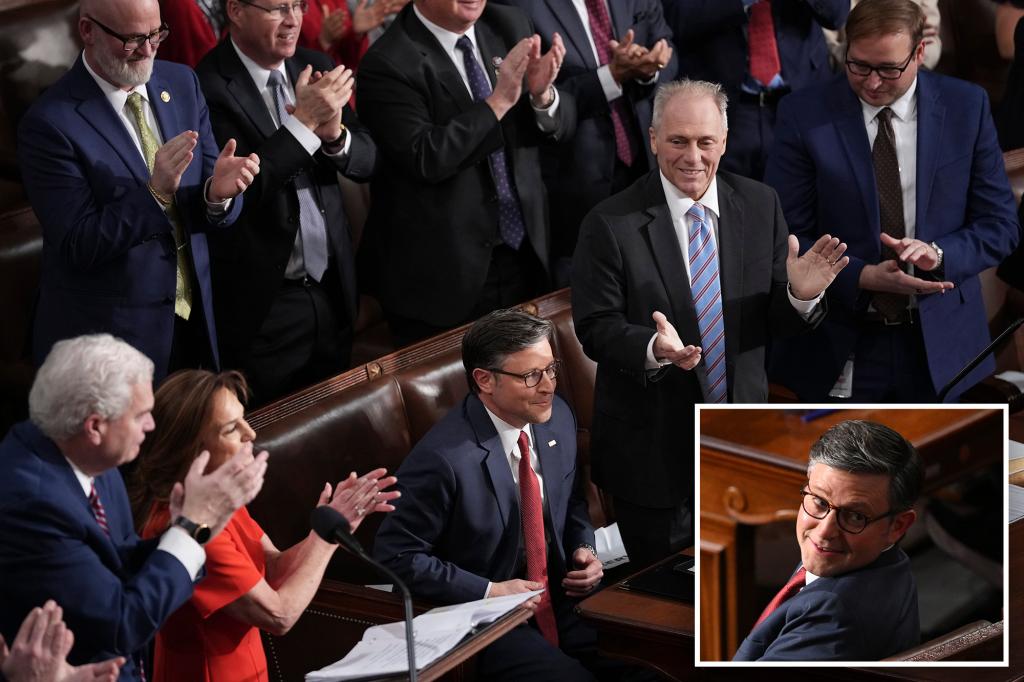The reelection of Speaker Mike Johnson (R-La.) was a dramatic affair, marked by last-minute vote flips and the direct intervention of President-elect Donald Trump. Johnson faced a precarious path to victory, holding a slim Republican majority in the House with 219 seats against 215 Democratic seats. This meant he could only afford to lose one Republican vote to secure the 218-vote majority needed to claim the speakership. Rep. Thomas Massie (R-Ky.), a consistent critic of Johnson, had publicly declared his refusal to support the incumbent, further complicating the situation and leaving Johnson with no margin for error.
The first round of voting exposed the deep divisions within the Republican party. Massie voted for Rep. Tom Emmer (R-Minn.), while other dissenters, including Reps. Ralph Norman (R-SC) and Keith Self (R-Texas), cast their votes for Reps. Jim Jordan (R-Ohio) and Byron Donalds (R-Fla.), respectively. These defections effectively jeopardized Johnson’s bid and prompted urgent outreach to President-elect Trump’s team. Rep. Marjorie Taylor Greene (R-Ga.) was observed contacting Trump’s chief of staff, Susie Wiles, directly from the House floor, highlighting the escalating tension. Trump himself intervened, speaking directly to Norman and Self, emphasizing the importance of unity and the potential damage a protracted speaker vote could inflict on the party’s image and legislative agenda.
Trump’s intervention proved decisive. He framed a second or third ballot as disrespectful to both the voters and himself, urging the dissenting Republicans to prioritize the party’s agenda. Following the conversation, both Norman and Self switched their votes to Johnson, securing him the speakership with a final tally of 218 votes. Trump’s desire for a swift confirmation of his nominees in the Senate and the immediate implementation of border security measures likely played a significant role in his decision to intervene directly in the House speaker vote.
The underlying tensions within the Republican party, however, remained unresolved. Fiscal conservatives had criticized Johnson’s leadership during the 118th Congress, accusing him of weakness in negotiations with Democrats, particularly regarding recent spending bills. Rep. Chip Roy (R-Texas), while not voting against Johnson, issued a letter outlining specific grievances and demands for changes in House procedures, including more working days, spending reductions through reconciliation packages, greater opportunities for amendments to bills, and the elimination of the “72-hour” rule. These demands underscored the ongoing challenges Johnson faces in unifying his party and effectively governing.
While Johnson claimed to have made no concessions to secure the votes of Self and Norman, Roy’s letter emphasizes the expectation that Johnson will adhere to Trump’s agenda. This includes prioritizing border security, cutting spending to combat inflation, banning stock trading by members of Congress, reversing President Biden’s Green New Deal subsidies and student loan forgiveness programs, among other key policy objectives. This suggests that despite winning the speakership, Johnson will face ongoing pressure to appease different factions within his party and deliver on a conservative agenda.
The Democratic side of the House remained united, with all 215 members voting for House Minority Leader Hakeem Jeffries (D-NY). Even former House Speaker Nancy Pelosi, recovering from a broken hip, flew in from California to participate in the vote. Jeffries commented on the Republican infighting, highlighting the internal divisions within the GOP. Trump’s consistent endorsement of Johnson in the days leading up to the vote, coupled with his celebratory message after Johnson’s victory, underscored the significant role the former president continues to play within the Republican party and his keen interest in shaping its legislative agenda. The dramatic events surrounding the speaker vote foreshadow potential challenges for the new Congress, with a narrow Republican majority and internal divisions likely to complicate the legislative process.

